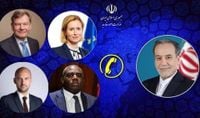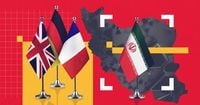In a week marked by urgent diplomacy and rising tensions, Iran and the three European powers—France, Germany, and the United Kingdom—have agreed to resume nuclear negotiations on August 26, 2025, in Vienna, aiming to stave off the reimposition of United Nations sanctions. The talks, which will take place at the level of deputy foreign ministers, come amid a flurry of phone calls and diplomatic statements that underscore both sides’ entrenched positions and the high stakes involved.
According to multiple reports, including those from Nova News and international wire services, the announcement followed a critical telephone conference on August 22, 2025. Iranian Foreign Minister Abbas Araghchi spoke with his counterparts from the so-called "E3"—France, Germany, and the United Kingdom—as well as Kaja Kallas, the European Union’s foreign policy chief. The timing is crucial: European leaders have threatened to invoke the "snapback" provision of the 2015 Joint Comprehensive Plan of Action (JCPOA), a mechanism that would reimpose a broad range of UN sanctions on Iran if it is found to be in violation of the agreement.
Araghchi, speaking for Tehran, outlined Iran’s firm opposition to the snapback mechanism. "Just as the Islamic Republic acts firmly in self-defense, it has never abandoned diplomacy and is prepared for any solution that guarantees the rights and interests of the Iranian people," he stated, as reported by Mehr News and corroborated by the Iranian Foreign Ministry. He stressed that the European countries and the EU "lack both the legal and moral authority to invoke the so-called ‘snapback’ mechanism," warning that any such move would have serious consequences.
The snapback mechanism is no mere bureaucratic tool. If triggered, it would automatically reinstate six previous UN Security Council resolutions adopted between 2006 and 2010. These would reimpose an arms embargo, export controls, travel bans, asset freezes, and other restrictions on Iranian individuals, entities, and banks. As Mehr News explained, the reactivation of these sanctions would not only halt Iran’s ability to import or export most military equipment but also isolate it further from the international financial system.
The European side, meanwhile, has attempted to keep the door open for diplomacy. On August 8, France, Britain, and Germany submitted a letter to the UN Security Council outlining their position on the snapback mechanism and proposals for the future of Resolution 2231—the Security Council measure that underpins the JCPOA. The E3 suggested a limited extension of some provisions tied to the resolution, in exchange for Iran resuming direct negotiations with Washington and addressing what they described as the most urgent concerns about Iran’s nuclear activities. According to Mehr News, they argued that such an extension would buy time for a new deal while maintaining the leverage of potential UN sanctions.
However, Iranian officials have categorically rejected this approach. Araghchi made clear that “the conditions for meaningful talks with the United States have not yet matured,” and Deputy Foreign Minister Saeed Khatibzadeh warned that European pressure is a miscalculation that could force Tehran into difficult decisions. Iranian authorities argue that resorting to snapback would strip Europe of any remaining role as a mediator and escalate tensions further.
The urgency of these talks is heightened by recent events. As reported by AP and other outlets, the European powers are alarmed by Iran’s enrichment of uranium to near weapons-grade levels, an escalation that occurred just before Iranian nuclear sites were bombed during the 12-day Iran-Israel war in June 2025. In response to those attacks, Iran cut off all cooperation with the International Atomic Energy Agency (IAEA), accusing the agency of passing sensitive information to Israel that enabled the targeting of nuclear sites and the assassination of scientists. Iran continues to insist that its nuclear program is for peaceful purposes only.
Despite the heated rhetoric, both sides have signaled a willingness to keep talking. The European ministers and the EU’s Kaja Kallas reiterated their commitment to finding a diplomatic solution. Kallas, in a statement following the calls, urged Iran to engage with the United States and cooperate fully with the IAEA to avoid the return of UN sanctions. "Europe is committed to a diplomatic solution to the nuclear issue. With the deadline for the snapback mechanism fast approaching, Iran’s readiness to engage with the US is crucial. Iran must also fully cooperate with the IAEA," she said.
Araghchi, for his part, told his European counterparts that while Iran has principled positions regarding the European proposal to extend UN Security Council Resolution 2231, the ultimate decision lies with the Security Council itself. He clarified that Iran does not intend to enter that process directly but will continue to consult and exchange views with its Security Council partners about the implications and the way forward.
Behind the scenes, there have been ongoing efforts to keep lines of communication open. Iranian deputy foreign ministers Majid Takht-Ravanchi and Kazem Gharibabadi met with senior representatives from the E3 countries in Istanbul on July 25, 2025, in a closed-door meeting that lasted over three hours. This followed a similar round of talks in May. Meanwhile, IAEA officials in Vienna have been preparing to meet with Iranian officials to continue discussions begun during an August 11 visit to Tehran.
European officials remain wary of time running out. German Foreign Minister Johann Wadephul remarked, “Time is short and Iran needs to engage substantively to avoid snapback activation.” French Foreign Minister Jean-Noel Barrot confirmed that another round of talks would happen as scheduled next week, emphasizing the need for real progress.
For Iran, the stakes are high. The government is determined to defend its national interests and sovereignty, but it is also keenly aware of the economic and diplomatic costs of renewed international isolation. Iranian leaders have repeatedly said they are ready for “any diplomatic solution that guarantees the rights and interests of the Iranian people,” but they remain deeply skeptical of Western intentions and wary of what they see as Europe’s last-ditch negotiating tactics.
As the world watches, the outcome of next week’s meeting in Vienna could shape not only the future of the Iranian nuclear program but also the broader security architecture of the Middle East. With both sides digging in and the threat of renewed sanctions looming, the coming days may prove decisive in determining whether diplomacy can still carry the day—or whether another chapter of confrontation is about to begin.
For now, all eyes are on Vienna, as diplomats prepare for another round that could tip the balance between escalation and engagement.





